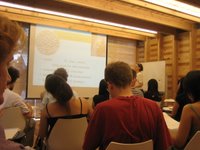
Yesterday I went to Arashiyama for the last day of the 2006 Kyoto Music Festival. The 20 minute tram ride from Shijo-Omiya took us straight to the western most subdivision of Kyoto. Praised for its accessible nature walks, its numerous Shinto and Buddhist shrines, and the beautiful Katsura river, Arashiyama was a wonderful surprise. Immediately after exiting the tram, my friend and I ran right into a Japanese a capella group performing their rendition of a "Rent" tune. Although captivating, we decided to side-step them and instead climb the steep slopes of, what is known as, Sarukouen, which means Monkey Park. Indeed, there are over 170 running, jumping, screaming, Japanese monkeys living in the park (above).
 After spending some time with the monkeys, we climbed down, deciding to see the mainstage. There, next to the tacoyaki and ikayaki stand on the left bank of the Katsura river, we listened to a great jazz quartet from Nagoya perform different versions of anything from the Doors to Japanese folk songs. Then a church choir came on, and it got kind of wierd. We didn't feel like getting preached to, so we left in search of a famous bamboo forest off the river. As it became darker, we paid one last visit to the church choir, then left for the local station. The sun hid behind the green hills, and with the sound of the river water in our ears, we climbed back on the tram bound for the sweet streams of eastern Kyoto.
After spending some time with the monkeys, we climbed down, deciding to see the mainstage. There, next to the tacoyaki and ikayaki stand on the left bank of the Katsura river, we listened to a great jazz quartet from Nagoya perform different versions of anything from the Doors to Japanese folk songs. Then a church choir came on, and it got kind of wierd. We didn't feel like getting preached to, so we left in search of a famous bamboo forest off the river. As it became darker, we paid one last visit to the church choir, then left for the local station. The sun hid behind the green hills, and with the sound of the river water in our ears, we climbed back on the tram bound for the sweet streams of eastern Kyoto.



